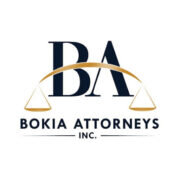Best Landlord & Tenant Lawyers in Midrand
Share your needs with us, get contacted by law firms.
Free. Takes 2 min.
Free Guide to Hiring a Real Estate Lawyer
List of the best lawyers in Midrand, South Africa
South Africa Landlord & Tenant Legal Questions answered by Lawyers
Browse our 3 legal questions about Landlord & Tenant in South Africa and read the lawyer answers, or ask your own questions for free.
- Can we evict tenants of our property if it is sold?
- May we evict the tenants of our property if it is sold. We have given them notice re this. They have not been paying rent nor deposit. We were very close of losing the house with the bank due to the tenants non payment
-
Lawyer answer by Recososa Law Firm
Hello:Under Philippine law, the rights of both the property owner and the tenants are governed mainly by the Civil Code and the Rent Control Act (if applicable depending on the rental amount). Since you mentioned that the tenants are not...
Read full answer - Eviction appeal
- Good day I had a tenant legally evicted and tool immediate occupation of my property she then went in later that day to her lawyers and got a re reentry court order, failing to disclose that I was already in the property. She and her boyfriend have broken in to... Read more →
-
Lawyer answer by SJ Law Experts
SJ Law Experts, IslamabadThank youSJ Law Experts, Islamabad [Advocates, Legal Advisors & Immigration Lawyers]
Read full answer - Is there a reason that my landlord is refusing to provide proof of putting my security deposit into an interest bearing account?
- The landlord at my former place of residence agreed to pay R8000 of my R11000 deposit after cleaning was done to the property. She provided a R2000 quotation fee but hasn't given me any other receipts to prove how the money was used. Despite that, I believe that cleaning was... Read more →
-
Lawyer answer by NARAG LAW OFFICE
That is not required by law. It is not even in the contract.
Read full answer
About Landlord & Tenant Law in Midrand, South Africa
Landlord and tenant law in Midrand, South Africa governs the rental relationship between property owners (landlords) and people who lease property (tenants). This area of law outlines the rights, duties, and obligations of both parties for the duration of a rental agreement, whether it is for residential or commercial property. The law aims to strike a fair balance, ensuring landlords can protect and manage their property while tenants enjoy security and reasonable living conditions. Midrand, situated in Gauteng between Johannesburg and Pretoria, follows national South African legislation but also observes certain regional protocols and by-laws that may impact rental relationships.
Why You May Need a Lawyer
There are several situations where landlords or tenants in Midrand might need legal assistance. These can include drafting or interpreting lease agreements, resolving disputes over deposits or property damage, handling unlawful evictions, challenging rental increases, or addressing maintenance and repair issues. Lawyers help interpret sometimes complex laws and ensure that their clients’ rights are protected. Legal assistance is especially important if a matter involves the Rental Housing Tribunal, court proceedings, or significant financial disputes.
Consulting a lawyer early can prevent misunderstandings, minimize financial losses, and help parties avoid unnecessary court battles or legal complications. Both landlords and tenants can benefit from professional guidance to ensure that they comply with all legal requirements and that their interests are safeguarded.
Local Laws Overview
The main legislation governing landlord and tenant matters in Midrand is the Rental Housing Act 50 of 1999. This Act provides the framework for residential leases across South Africa, including Midrand. Key points include:
- Written lease agreements: While verbal agreements are legally binding, written contracts are strongly recommended. Both parties are entitled to a written lease on request.
- Rental payments and increases: The lease should clearly state rental amounts and any potential increases. Any increase must be reasonable and in accordance with market conditions or agreement terms.
- Deposits: Landlords may require a deposit, which must be held in a bank account and accrue interest. The landlord must provide proof of deposit placement and interest earned upon request.
- Maintenance and repairs: Landlords must keep the property in a habitable condition. Tenants are responsible for keeping the property clean and for minor repairs.
- Eviction procedures: Unlawful evictions are prohibited. Landlords must follow the correct legal process, including applying to a court for an eviction order under the Prevention of Illegal Eviction from and Unlawful Occupation of Land Act (PIE Act).
- The Rental Housing Tribunal: This body resolves landlord-tenant disputes without the need for court proceedings. It is free, accessible, and can issue binding rulings.
Other local by-laws or homeowner association rules may also impact lease agreements or conduct, especially in residential estates or complexes.
Frequently Asked Questions
What should be included in a valid lease agreement?
A valid lease agreement should state the names and contact details of both parties, property description, rental amount and payment date, deposit required, lease period, maintenance responsibilities, and conditions for renewal or cancellation.
Is a verbal lease agreement legally binding?
Yes, verbal lease agreements are valid in South Africa. However, having a written lease is always best as it provides clear evidence of the terms agreed upon and helps to avoid disputes.
How much deposit can a landlord require?
There is no set legal limit, but most landlords ask for a deposit equivalent to one or two months' rent. The deposit must be held in an interest-bearing account and returned, with interest, at the end of the lease minus any deductions for damages.
What can be deducted from a tenant’s deposit?
Reasonable deductions can be made for unpaid rent, damages (excluding fair wear and tear), and loss of keys or remotes. The landlord must provide receipts or statements for any deductions.
Can a landlord increase the rent at any time?
No, rent increases must follow the terms set out in the lease. Typically, rent can only be increased once per year and must be fair and in line with market rates. The landlord must provide proper notice, usually at least one month in advance.
What is the process for eviction of a tenant?
A landlord must first give proper notice to the tenant as required by the lease or by law. If the tenant does not leave, the landlord must apply to the court for an eviction order under the PIE Act. Evictions without a court order are illegal.
What are the tenant’s responsibilities regarding maintenance?
Tenants must take care of the property and keep it clean. They are responsible for minor repairs and for reporting any major maintenance issues to the landlord promptly.
What is the Rental Housing Tribunal and how can it help me?
The Rental Housing Tribunal is a provincial body that deals with disputes between landlords and tenants. It offers free dispute resolution services and can issue binding legal rulings. This service is especially useful for tenants or landlords who cannot afford court proceedings.
Can a landlord enter the rented property without permission?
No, except in cases of emergency, the landlord must provide reasonable notice and obtain the tenant's consent before entering the premises for inspections or repairs.
What happens if a tenant stays after the lease has ended?
If both parties agree, the lease may continue on a month-to-month basis under the same terms. If the landlord does not want the tenant to stay, proper legal notice must be given, and the landlord may apply for eviction if the tenant refuses to leave.
Additional Resources
For assistance and more information on landlord and tenant matters in Midrand, consider the following resources:
- Rental Housing Tribunal (Gauteng Province): Assists with disputes and can mediate between landlords and tenants.
- Legal Aid South Africa: Provides free legal advice and representation to qualifying individuals.
- Midrand Magistrate’s Court: Handles legal proceedings, including evictions.
- South African Human Rights Commission: Offers support in cases where housing rights may be violated.
- Estate Agency Affairs Board: Regulates estate agents and can assist with complaints about agents.
Next Steps
If you are experiencing a landlord and tenant issue in Midrand, start by reviewing your lease agreement and gathering any relevant documents or communication. Consider speaking to the other party directly to resolve the issue. If this is unsuccessful, contact the Rental Housing Tribunal for free mediation and advice.
For more complex matters, such as unlawful eviction, large financial disputes, or if you are unsure of your rights and obligations, seek guidance from a qualified attorney. Legal professionals can help you understand your legal position, assist in negotiations, represent you in court or tribunal hearings, and help protect your rights. Make sure to act promptly, as delaying action could affect your case or available remedies.
Lawzana helps you find the best lawyers and law firms in Midrand through a curated and pre-screened list of qualified legal professionals. Our platform offers rankings and detailed profiles of attorneys and law firms, allowing you to compare based on practice areas, including Landlord & Tenant, experience, and client feedback.
Each profile includes a description of the firm's areas of practice, client reviews, team members and partners, year of establishment, spoken languages, office locations, contact information, social media presence, and any published articles or resources. Most firms on our platform speak English and are experienced in both local and international legal matters.
Get a quote from top-rated law firms in Midrand, South Africa — quickly, securely, and without unnecessary hassle.
Disclaimer:
The information provided on this page is for general informational purposes only and does not constitute legal advice. While we strive to ensure the accuracy and relevance of the content, legal information may change over time, and interpretations of the law can vary. You should always consult with a qualified legal professional for advice specific to your situation.
We disclaim all liability for actions taken or not taken based on the content of this page. If you believe any information is incorrect or outdated, please contact us, and we will review and update it where appropriate.









